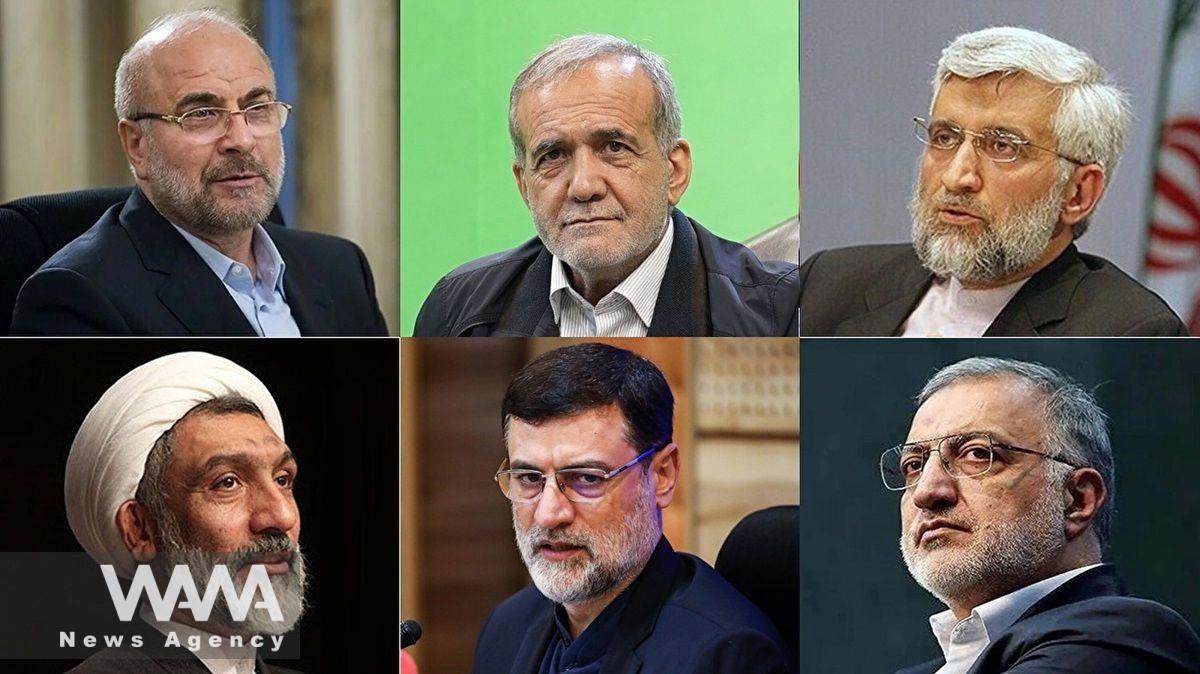Third Televised Debate Iran’s 2024 presidential election
WANA (June 22) – The third televised debate in the 2024 Iranian presidential election has occurred, with six contenders presenting their blueprints on the country’s cultural and social issues. This debate follows the first, held on Monday, and the second, staged on Thursday and centered on economic and socio-economic issues. Here are highlights of the third televised presidential debate hosted by the Islamic Republic of Iran Broadcasting (IRIB).
Alireza Zakani:
My record during the Islamic Revolution is clear, and I am accountable for my actions.
Freedom is the people’s right, and the Islamic Revolution has granted this right.
I will prevent the interference of non-specialized agencies in the cultural sector. When discussing (the issue of) Hijab, we should speak precisely. The Hijab is both a religious and legal matter.
Filtering differs from safeguarding. Some initially recklessly allowed messaging platforms to emerge without control. Foreign messaging apps can also come (to Iran) provided they commit to (the country’s) laws.
The president should be able to lead the country’s cultural arena and manage cultural budgets.
Just as the U.S. tries to prevent us from nuclear technology or other industries, it also makes such efforts in the arts field.
We must not allow the glorious role of Iranian women in various fields to be censored. We have plans to strengthen families. The Hijab is the dress code for women’s social presence, and it preserves and enhances the sanctity of the family.
The West remains silent about thousands of women in Gaza. Still, it takes a stance on the death of one woman in Iran because the Islamic Republic has brought women to the forefront and presented a model showcasing a Muslim woman as an entrepreneur, scientist, and exemplary mother.
Masoud Pezeshkian:
When women’s rights are ignored, voices should be raised. Women should be in a position where they can play a constructive role. We are against any coercion or harsh treatment towards anyone, let alone women.
Behavior won’t change with laws. Just as they couldn’t forcibly remove the Hijab from Iranian women before, we will not be able to impose the Hijab on them forcefully.
What’s the need to filter the internet? We should set it free. Twitter is a place for education, and we can teach many things through it.
The government should refrain from interference (in art and culture) and be the policymaker and overseer of programs.

WANA – Presidential candidates
Mostafa Pour Mohammadi:
People must choose between a government that evades responsibilities and a government that is committed. Our mission in the government is to defend cultural identity, cultural justice, and the rights of creators and artists.
We must elevate capacities throughout Iran with proper management and utilize them effectively domestically and internationally. We need to establish a strong messaging platform. My primary concern has always been creating a capable messaging platform to meet domestic, regional, and global needs.
The Hijab is a religious and legal requirement, and we all accept that. For 40 years, we have been trying to promote Islamic dress. We have spent a lot of public funds on this through media, universities, schools, etc, but we have yet to achieve the desired result. Women have made significant progress in the Islamic Republic of Iran but still need to reach their proper positions.
Our children have grown up with the virtual space since their early childhood. The solution is not to deprive ourselves of opportunities to combat harm.
Amir Hossein Ghazizadeh Hashemi:
I will deal with filtering (in the virtual space) according to societal norms. Precise and scientific filtering has not been implemented. We filtered Google Play and some games, which is a form of public harassment. The best filter is the community norms. We should empower families to restrict internet usage, and various models are available.
The next government should subsidize books, cinema, and family entertainment.
We have been able to convey the discourse of resistance to American universities. Can’t we convey Iranian culture and heritage?
The message from our women is that discrimination against women means restricting their access to facilities and job opportunities.
The government is obliged to employ women with children and provide facilities such as affordable childcare centers.
Mohammad Bagher Ghalibaf:
We must strive to keep culture away from political decisions and politicization so that it does not suffer damage.
We need to safeguard the internet without restrictions and unconditionally support successful domestic (virtual) platforms.
Precise and intelligent monitoring of the virtual space is also necessary to alleviate families’ concerns, especially about our youth. I am definitely against filtering because it will have many dangers and lead to corruption.
The Hijab and Chastity Bill outlines how things should be done. Violence against (those not observing) Hijab is condemned. The institutions with cultural roles are not doing their part regarding Hijab.
If we want a strong Iran, we must have strong families; women are the driving force within the family.
By WANA writer

Shifting Dynamics: A Wake-Up Call for Conservatives
WANA (June 22) – The third debate between the candidates for Iran’s presidential election was held amid heightened election fervor, attracting a larger audience. This debate focused on culture under the theme “Social Cohesion through Cultural Governance,” the candidates answered questions regarding women’s status in the country, the importance of their presence in society, governance […]












